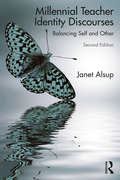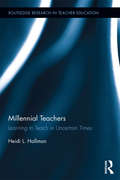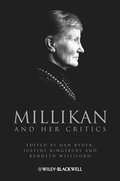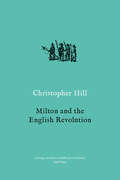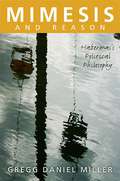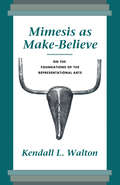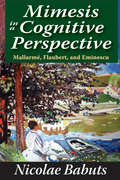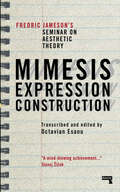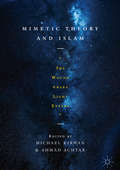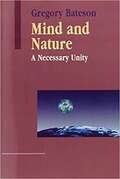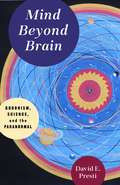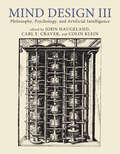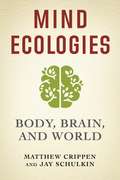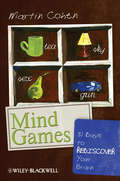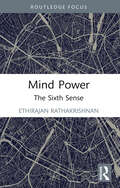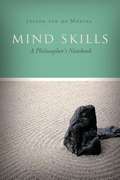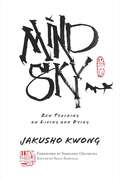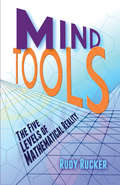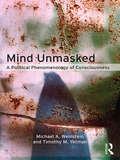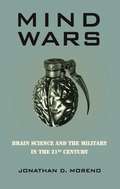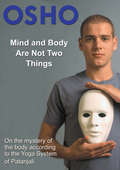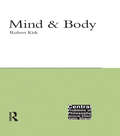- Table View
- List View
Millennial Teacher Identity Discourses: Balancing Self and Other
by Janet AlsupOver ten years after the original edition of Teacher Identity Discourses, Janet Alsup revisits her work with a new research study examining the characteristics of the millennial teachers now beginning to populate K-12 classrooms. Building off the first edition, this text is based on a qualitative, interview-based research study, and provides a contemporary look at how millennial teachers experience professional identity growth through language use. This innovative research investigates how formation of a professional identity is central in the process of becoming an effective teacher. Updated with new analyses of teacher identity discourses, the second edition covers themes that still resonate today and provides practical suggestions and sample assignments for teacher educators to use or adapt in methods courses.
Millennial Teachers: Learning to Teach in Uncertain Times (Routledge Research in Teacher Education #11)
by Heidi L. HallmanDrawing on narratives of five beginning teachers, Millennial Teachers explores the tensions in teachers’ young careers and how changing social, economic, and technological conditions of our current era both afford and constrain teachers’ identities and in contexts in which they work. Examining case studies of beginning teachers, Hallman draws a generational portraits of novice teachers and identifies the challenges inherent in transitioning from pre-service teacher to in-service teacher. This book synthesizes these teachers’ views on a range of topics and provides an understanding of the evolving pressures and possibilities of future teachers of the "millennial" generation.
Millikan and Her Critics (Philosophers and their Critics #15)
by Kenneth Williford Dan Ryder Justine Ki NgsburyMillikan and Her Critics offers a unique critical discussion of Ruth Millikan's highly regarded, influential, and systematic contributions to philosophy of mind and language, philosophy of biology, epistemology, and metaphysics. These newly written contributions present discussion from some of the most important philosophers in the field today and include replies from Millikan herself. Comprises 13 new essays that critically examine the highly regarded and influential work of Ruth Millikan Covers a wide range of Millikan's most important work, from philosophy of mind and language to philosophy of biology Features contributions by some of the most important and influential philosophers working today Includes original replies to critics by Millikan
Milton and the English Revolution
by Christopher HillRemarkable reinterpretation of Milton and his poetry by one of the most famous historians of the 17th CenturyIn this remarkable book Christopher Hill used the learning gathered in a lifetime's study of seventeenth-century England to carry out a major reassessment of Milton as man, politician, poet, and religious thinker. The result is a Milton very different from most popular imagination: instead of a gloomy, sexless 'Puritan', we have a dashingly original thinker, branded with the contemporary reputation of a libertine. For Hill, Milton is an author who found his real stimulus less in the literature of classical and times and more in the political and religious radicalism of his own day. Hill demonstrates, with originality, learning and insight, how Milton's political and religious predicament is reflected in his classic poetry, particularly 'Paradise Lost' and 'Samson Agonistes'.
Milton and the Puritan Dilemma, 1641-1660
by Arthur E. BarkerThis analysis of the progressive definition of John Milton's social, political, and religious opinions during the fertile years of the Puritan Revolution has become a classic work of scholarship in the thirty-five years since it was first published. Professor Barker interprets Milton's development in the light of his personal problems and of the changing climate of opinion among his revolutionary associates.
Mimesis and Reason: Habermas's Political Philosophy
by Gregg Daniel MillerComplicating the standard interpretation of Habermas as a proceduralist, Mimesis and Reason uncovers the role that mimesis, or imitation, plays as a genuinely political force in communicative action. Through a penetrating examination of Habermas's use of themes and concepts from Plato, George Herbert Mead, and Walter Benjamin, Gregg Daniel Miller reconstructs Habermas's theory to reveal a new, postmetaphysical articulation of reason that lays the groundwork for new directions in political theory.
Mimesis as Make-Believe: On the Foundations of the Representational Arts
by Kendall L. WaltonRepresentations—in visual arts and in fiction—play an important part in our lives and culture. Kendall Walton presents here a theory of the nature of representation, which illuminates its many varieties and goes a long way toward explaining its importance. Drawing analogies to children’s make believe activities, Walton constructs a theory that addresses a broad range of issues: the distinction between fiction and nonfiction, how depiction differs from description, the notion of points of view in the arts, and what it means for one work to be more “realistic” than another. He explores the relation between appreciation and criticism, the character of emotional reactions to literary and visual representations, and what it means to be caught up emotionally in imaginary events. Walton’s theory also provides solutions to the thorny philosophical problems of the existence—or ontological standing—of fictitious beings, and the meaning of statements referring to them. And it leads to striking insights concerning imagination, dreams, nonliteral uses of language, and the status of legends and myths. Throughout Walton applies his theoretical perspective to particular cases; his analysis is illustrated by a rich array of examples drawn from literature, painting, sculpture, theater, and film. Mimesis as Make-Believe is important reading for everyone interested in the workings of representational art.
Mimesis in a Cognitive Perspective: Mallarme, Flaubert, and Eminescu
by Nicolae BabutsMimesis is a critical and philosophical term going back to Aristotle. It carries a wide range of meanings, including imitation, representation, mimicry, the act of expression, and the presentation of self. In modern literary criticism, mimesis has received renewed attention in the last two or three decades and been subject to wide-ranging interpretations. Nicolae Babuts looks at the concept of mimesis from a cognitive perspective. He identifies two main strands: the mimetic relation of art and poetry to the world, defined in terms of reference to an external reality, and the importance of memory in the making of plots or storytelling.Babuts suggests that there is a material identity we cannot know beyond the limits of our senses and intellect and a symbolic or coded identity that is processed by memory. All writers, including Mallarme in his esoteric poetry, Flaubert in his realist narratives, and Mihai Eminescu, the Romanian poet, in his romantic poems, rely on mimetic strategies to link the two identities: the images in memory to the outside reality. All order their narratives in accordance with the dynamics of memory. Babuts describes this phenomenon with great insight, showing how new traditions are formed.
Mimesis, Expression, Construction: Fredric Jamesons Seminar on Aesthetic Theory
by Fredric JamesonMimesis, Expression, Construction brings Fredric Jameson's famous Duke University seminar on Adorno&’s Aesthetic Theory into print for the first time.Transcribed and edited from audio recordings taken by Octavian Esanu of the original seminar at Duke University in 2003, Mimesis, Expression, Construction reproduces Jameson and his students' engagement with Aesthetic Theory, one of the most influential theories of modernist aesthetics.The first and only published record of Jameson's teaching and pedagogic style, the seminar delves into modern and modernist aesthetics through the perspectives of Kant, Hegel, Freud, Schopenhauer, and Nietzsche; Benjamin and other members of the Frankfurt School; the literary works of Thomas Mann and Samuel Beckett; the music of Schoenberg, Webern and Berg; the films of Chaplin, Vertov and Eisenstein; the aesthetic implications of psychoanalysis and biblical exegesis; classical music; and more.Presented in the format of a play, with stage setting, student interruptions and exchanges, interjections, auditory noises, and ambient sounds, and complemented with scans of students' notes, Mimesis, Expression, Construction is a groundbreaking addition to the work of one of the greatest modern cultural critics.
Mimetic Theory and Islam: "The Wound Where Light Enters"
by Michael Kirwan Ahmad AchtarThis volume explores the 'Mimetic Theory' of the cultural theorist René Girard and its applicability to Islamic thought and tradition. Authors critically examine Girard's assertion about the connection between group formation, religion, and 'scapegoating' violence. These insights, Girard maintained, have their source in biblical revelation. Are there parallels in other faith traditions, especially Islam? To this end, Muslim scholars and scholars of Mimetic Theory have examined the hypothesis of an 'Abrahamic Revolution.' This is the claim that Judaism, Christianity, and Islam each share in a spiritual and ethical historical 'breakthrough:' a move away from scapegoating violence, and towards a sense of justice for the innocent victim.
Mind And Cosmos: Why The Materialist Neo-darwinian Conception Of Nature Is Almost Certainly False
by Thomas NagelThe modern materialist approach to life has conspicuously failed to explain such central mind-related features of our world as consciousness, intentionality, meaning, and value. This failure to account for something so integral to nature as mind, argues philosopher Thomas Nagel, is a major problem, threatening to unravel the entire naturalistic world picture, extending to biology, evolutionary theory, and cosmology. <p><p> Since minds are features of biological systems that have developed through evolution, the standard materialist version of evolutionary biology is fundamentally incomplete. And the cosmological history that led to the origin of life and the coming into existence of the conditions for evolution cannot be a merely materialist history, either. An adequate conception of nature would have to explain the appearance in the universe of materially irreducible conscious minds, as such. <p> Nagel's skepticism is not based on religious belief or on a belief in any definite alternative. In Mind and Cosmos, he does suggest that if the materialist account is wrong, then principles of a different kind may also be at work in the history of nature, principles of the growth of order that are in their logical form teleological rather than mechanistic. <p> In spite of the great achievements of the physical sciences, reductive materialism is a world view ripe for displacement. Nagel shows that to recognize its limits is the first step in looking for alternatives, or at least in being open to their possibility.
Mind And Nature: A Necessary Unity
by Gregory BatesonA re-issue of Gregory Bateson's classic work. It summarizes Bateson's thinking on the subject of the patterns that connect living beings to each other and to their environment.
Mind Beyond Brain: Buddhism, Science, and the Paranormal
by David PrestiAmong the most profound questions we confront are the nature of what and who we are as conscious beings, and how the human mind relates to the rest of what we consider reality. For millennia, philosophers, scientists, and religious thinkers have attempted answers, perhaps none more meaningful today than those offered by neuroscience and by Buddhism. The encounter between these two worldviews has spurred ongoing conversations about what science and Buddhism can teach each other about mind and reality.In Mind Beyond Brain, the neuroscientist David E. Presti, with the assistance of other distinguished researchers, explores how evidence for anomalous phenomena—such as near-death experiences, apparent memories of past lives, apparitions, experiences associated with death, and other so-called psi or paranormal phenomena, including telepathy, clairvoyance, and precognition—can influence the Buddhism-science conversation. Presti describes the extensive but frequently unacknowledged history of scientific investigation into these phenomena, demonstrating its relevance to questions about consciousness and reality. The new perspectives opened up, if we are willing to take evidence of such often off-limits topics seriously, offer significant challenges to dominant explanatory paradigms and raise the prospect that we may be poised for truly revolutionary developments in the scientific investigation of mind. Mind Beyond Brain represents the next level in the science and Buddhism dialogue.
Mind Design III: Philosophy, Psychology, and Artificial Intelligence
by John Haugeland, Carl F. Craver, and Colin KleinThe essential reader on the philosophical foundations and implications of artificial intelligence, now comprehensively updated for the twenty-first century.In the quarter century since the publication of John Haugeland&’s Mind Design II, computer scientists have hit many of their objectives for successful artificial intelligence. Computers beat chess grandmasters, driverless cars navigate streets, autonomous robots vacuum our homes, and ChatGPT answers existential queries in iambic pentameter on command. Engineering has made incredible strides. But have we made progress in understanding and building minds? Comprehensively updated by Carl Craver and Colin Klein to reflect the astonishing ubiquity of machine learning in modern life, Mind Design III offers an essential collection of classic and contemporary essays on the philosophical foundations and implications of artificial intelligence. Contributions from a diverse range of philosophers and computer scientists address the nature of computation, the nature of thought, and the question of whether computers can be made to think. With extensive new material reflecting the explosive growth and diversification of AI approaches, this classic reader equips students to assess the possibility of, and progress toward, building minds out of computers.New edition highlights: New chapters on advances in deep neural networks, reinforcement learning, and causal learningNew material on the complementary intersection of neuroscience and AIOrganized thematically rather than chronologically Brand new introductions to each section that include suggestions for coursework and further reading
Mind Ecologies: Body, Brain, and World
by Jay Schulkin Matthew CrippenPragmatism—a pluralistic philosophy with kinships to phenomenology, Gestalt psychology, and embodied cognitive science—is resurging across disciplines. It has growing relevance to literary studies, the arts, and religious scholarship, along with branches of political theory, not to mention our understanding of science. But philosophies and sciences of mind have lagged behind this pragmatic turn, for the most part retaining a central-nervous-system orientation, which pragmatists reject as too narrow.Matthew Crippen, a philosopher of mind, and Jay Schulkin, a behavioral neuroscientist, offer an innovative interdisciplinary theory of mind. They argue that pragmatism in combination with phenomenology is not only able to give an unusually persuasive rendering of how we think, feel, experience, and act in the world but also provides the account most consistent with current evidence from cognitive science and neurobiology. Crippen and Schulkin contend that cognition, emotion, and perception are incomplete without action, and in action they fuse together. Not only are we embodied subjects whose thoughts, emotions, and capacities comprise one integrated system; we are living ecologies inseparable from our surroundings, our cultures, and our world. Ranging from social coordination to the role of gut bacteria and visceral organs in mental activity, and touching upon fields such as robotics, artificial intelligence, and plant cognition, Crippen and Schulkin stress the role of aesthetics, emotions, interests, and moods in the ongoing enactment of experience. Synthesizing philosophy, neurobiology, psychology, and the history of science, Mind Ecologies offers a broad and deep exploration of evidence for the embodied, embedded, enacted, and extended nature of mind.
Mind Games
by Martin CohenThis original and innovative book is an exploration of one of the key mysteries of the mind, the question of consciousness. Conducted through a one month course of both practical and entertaining 'thought experiments', these stimulating mind-games are used as a vehicle for investigating the complexities of the way the mind works.By turns, fun, eye-opening and intriguing approach to thinking about thinking, which contains inventive and engaging 'thought experiments' for the general readerIncludes specially drawn illustrations by the French avant-garde artist, JuditReunites the social science disciplines of psychology, sociology and political theory with the traditional concerns of philosophy
Mind Power: The Sixth Sense
by Ethirajan RathakrishnanThis book explores the mysteries of the human brain and the potential of the mind. The peculiarities and infinitude of the mind have been a theme for research for scientists and philosophers alike, for centuries. This volume presents the unanswered and highly convoluted questions and hypotheses surrounding the human mind in a simplified way. It examines the binaries of religion and science, god and nature and emotions and intelligence through a philosophical lens to posit that the relationships between cognition, belief, nature and science are what we understand and infer based on our surroundings and how much we are willing to think, learn and introspect.This book will be of interest to students of philosophy, psychology, science, popular science, psychoanalysis, cognitive studies and mental health. It will also appeal to general readers.
Mind Skills: A Philosopher's Notebook
by Joseph Van de Mortel<p>In this notebook, Joseph van de Mortel reflects on the role of epiphany and the value of philosophy, covering thinkers, concepts, methods, and principles. The result is a useful and entertaining sourcebook for every desk. The pedagogical recommendations for reading difficult material are also here. They have helped many of the author's students win scholarships and gain admission to top universities, including UC Berkeley, Stanford, and UCLA. Every dedicated student will want to review and utilize these simple methods for acquiring the habits that great students possess. <p>In addition to reflecting on the problem of mental fragmentation, the author introduces a rich content for better word selection and discusses the importance of mindfulness and listening, lecture notes, reading notes, the read and stop method, the Socratic method, the circle method, the purpose of ethics, the chronology of philosophy, and the four aspects of philosophy. <p>If academic self-confidence is a product of knowing what works, then this text supports that outcome. It argues that many of the problems students face are practical and can be demystified and solved with the introduction of good mental habits that are the benchmarks of sound, critical thinking.</p>
Mind Sky: Zen Teaching on Living and Dying
by Jakusho Kwong-roshiA collection of talks, photos, and calligraphy by Jakusho Kwong-roshi, exploring the profound beauty of Zen history and practice, nature, and the philosophy of the ancient Zen master Eihei Dogen.&“In Zen meditation, anything that comes in your mind will eventually leave, because nothing is permanent. A thought is like a cloud moving across the blue sky. Nothing can disturb that all-encompassing vastness. This is the Dharma". In a collection of talks and anecdotes, Jakusho Kwong-roshi, a Dharma successor of Shunryu Suzuki-roshi, presents his approach to Buddhist teaching. Containing photos of Kwong-roshi with his teachers, as well as a selection of his vibrant calligraphy, Mind Sky explores the profound beauty of Zen history and practice, nature, and the philosophy of the ancient Zen master Eihei Dogen. With an elegant simplicity, Jakusho Kwong-roshi shows how Zen is experiential rather than intellectual. And with persistent practice, realization is already yours.
Mind Tools: The Five Levels of Mathematical Reality
by Rudy RuckerThis reader-friendly volume groups the patterns of mathematics into five archetypes: numbers, space, logic, infinity, and information. Rudy Rucker presents an accessible introduction to each of these important areas, reflecting intelligence gathered from the frontiers of mathematical thought. More than 100 drawings illuminate explorations of digital versus analog processes, logic as a computing tool, communication as information transmission, and other "mind tools.""Mind Tools is an original and fascinating look at various aspects of mathematics that is sure to fascinate the nonmathematician." -- Isaac Asimov "A lighthearted romp through contemporary mathematics. . . . Mind Tools is a delight." -- San Francisco Chronicle"For those who gave up college mathematics for what seemed more liberal arts, Rudy Rucker's book, Mind Tools, is a dazzling refresher course. . . . He rekindles the wonder that can come from contemplating logarithms, exponential curves and transcendental numbers." -- The New York Times Book Review"One of Rucker's greatest assets is his ability to make complexities comprehensible to the general reader without lecturing." -- The Washington Post"Approaching all of mathematics, and everything else, by way of information theory, Dr. Rucker's latest and most exciting book opens vistas of dazzling beauty -- scenes that blend order with chaos, reality with fantasy, that startle you with their depths of impenetrable mystery." -- Martin Gardner
Mind Transformer
by PriyadarshiniiPriyadarshinii Was a certified master practitioner of Neuro-Linguistic Programming. She did her Master's in Business Administration from Singapore. She worked as a business executive for 2 years in Transasia Biomedical Ltd Mumbai. After which, she worked as a success coach for School of Excellence. Since 2011, Priyadarshinii was suffering from a rare & incurable disease called MPGN-2 which leads to loss of vision, mobility, motor functions & eventually ... life. After fighting a long battle with her incurable disease Priyadarshinii's inspirational soul departed for heavenly aboard in August . She coached more than 500 clients to be successful in their goals, be it their career, relationship, finance, health, personality, etc.
Mind Unmasked: A Political Phenomenology of Consciousness
by Michael A. Weinstein Timothy M. YetmanThe human mind has proven uniquely capable of unraveling untold mysteries, and yet, the mind is fundamentally challenged when it turns back on itself to ask what it itself is. How do we conceive of mind in this postmodern world; how can we use philosophical anthropology to understand mind and its functions? While philosophers and social scientists have made important contributions to our understanding of mind, existing theories are insufficient for penetrating the complexities of mind in the twenty-first century. Mind Unmasked: A Political Phenomenology of Consciousness draws on twentieth-century philosophies of consciousness to explain the phenomenon of mind in the broadest sense of the word. Michael A. Weinstein and Timothy M. Yetman develop a thought provoking discourse that moves beyond the nature of the human experience of mind at both the individual and interpersonal levels and present a meditation on life in the contemporary world of global mass-mediated human culture.
Mind Wars
by Jonathan D. Moreno"One of the most important thinkers describes the literally mind-boggling possibilities that modern brain science could present for national security." -LAWRENCE J. KORB, former US Assistant Secretary of Defense"Fascinating and frightening." -Bulletin of the Atomic ScientistsThe first book of its kind, Mind Wars covers the ethical dilemmas and bizarre history of cutting-edge technology and neuroscience developed for military applications. As the author discusses the innovative Defense Advanced Research Projects Agency (DARPA) and the role of the intelligence community and countless university science departments in preparing the military and intelligence services for the twenty-first century, he also charts the future of national security.Fully updated and revised, this edition features new material on deep brain stimulation, neuro hormones, and enhanced interrogation. With in-depth discussions of "psyops" mind control experiments, drugs that erase both fear and the need to sleep, microchip brain implants and advanced prosthetics, supersoldiers and robot armies, Mind Wars may read like science fiction or the latest conspiracy thriller, but its subjects are very real and changing the course of modern warfare.Jonathan D. Moreno has been a senior staff member for three presidential advisory commissions and has served on a number of Pentagon advisory committees. He is an ethics professor at the University of Pennsylvania and the editor-in-chief of the Center for American Progress' online magazine Science Progress.
Mind and Body Are Not Two Things
by Osho Osho International FoundationPatanjali the founder of ancient Yoga has laid out a fascinating understanding of body and mind. Osho brings this ancient system into a contemporary understanding, creating a holistic approach to health and meditation. He give some significant attention and background understanding to vegetarianism stating that naturally, we should be vegetarians .
Mind and Body: Mind And Body (Central Problems Of Philosophy Ser. #11)
by Robert KirkA great deal of work in philosophy today is concerned with some aspect of the complex tangle of problems and puzzles roughly labelled the mind-body problem. This book is an introduction to it. It is a readable, lucid and accessible guide that provides readers with authoritative exposition, and a solid and reliable framework which can be built on as needed. The first chapter briefly introduces the subject and moves on to discuss mechanism - the idea that minds are machines - focusing on Searle's Chinese Room argument. The next three chapters discuss dualism, physicalism, and some hard problems for physicalism, especially those concerning phenomenal consciousness. Chapters on behaviourism and functionalism follow. The central mind-body topics are then each given deeper consideration in separate chapters. Intentionality is investigated via Fodor's doctrine of the Language of Thought, taking account of connectionism. The main theories of consciousness are examined and the author's own approach outlined. The concluding chapter briefly resumes the theme of psychological explanation, linking it to further topics. Each chapter ends with a summary of the main points together with suggestions for further reading.
